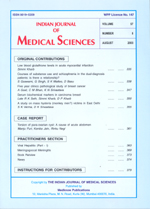
|
Indian Journal of Medical Sciences
Medknow Publications on behalf of Indian Journal of Medical Sciences Trust
ISSN: 0019-5359
EISSN: 0019-5359
Vol. 57, No. 12, 2003, pp. 549-555
|
 Bioline Code: ms03046
Bioline Code: ms03046
Full paper language: English
Document type: Research Article
Document available free of charge
|
|
|
Indian Journal of Medical Sciences, Vol. 57, No. 12, 2003, pp. 549-555
| en |
CIPROFLOXACIN-TINIDAZOLE COMBINATION, FLUCONAZOLE- AZITHROMICIN-SECNIDAZOLE-KIT AND DOXYCYCLINE- METRONIDAZOLE COMBINATION THERAPY IN SYNDROMIC MANAGEMENT OF PELVIC INFLAMMATORY DISEASE: A PROSPECTIVE RANDOMIZED CONTROLLED TRIAL
M MALHOTRA, J B SHARMA, S BATRA, R ARORA, S SHARMA
Abstract
Background: Pelvic inflammatory disease is a common problem faced by the gynecologists in out patient department.
Aim: The aim of the study was to evaluate the efficacy of three treatment combinations in the syndromic management of pelvic inflammatory disease in the out patient setting.
Setting design: In the medical college hospital patients presenting in gynecology out patient department were enrolled.
Material and methods: One hundred and sixty five women with diagnosis of pelvic inflammatory disease were randomized into three equal groups getting ciprofloxacin (500 mg) and tinidazole (600 mg) combination twice daily for 7 days (Group 1), a kit containing fluconazole (150 mg), azithromycin (1 gm) and secnidazole (2 gm) as one time dose (Group 2) and Doxycycline 100mg twice daily and metronidazole 200 mg thrice daily for seven days (Group 3). Severity score was determined on first visit and after 1 week and 4 weeks when patients were called for follow up. Stastical Analysis: Chi sqare test, Krusker Wallis test and Mann Whitney test.
Results: There was significant reduction in severity score after 1 week of treatment, which was further reduced after 4 weeks in all the three groups. Cure rate was highest in-group 1 (96%) followed by group 2 (93.5) and group 3 (91.3%) but the difference was not statistically significant. Resolution of inflammatory mass was highest in group 1. The incidence of side effects was highest and compliance was lowest in the doxycycline-metronidazole group, but the difference was not statistically significant.
Conclusion: All the three treatment combinations were found to be equally effective in the syndromic management of pelvic inflammatory disease.
Keywords
Pelvic Inflammatory disease, Reproductive tract infections, Sexually transmitted disease, Syndromic approach, Genital discharge
|
| |
© Copyright 2003 - Indian Journal of Medical Sciences.
Alternative site location: http://www.indianjmedsci.org/
|
|
